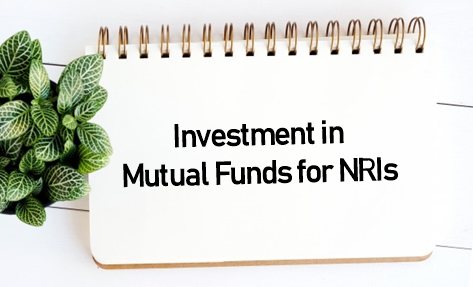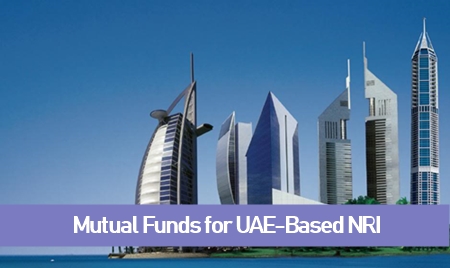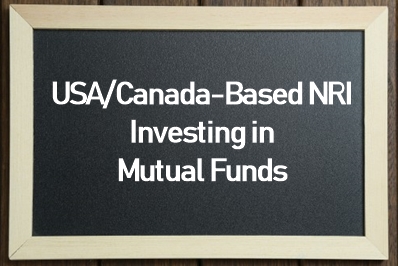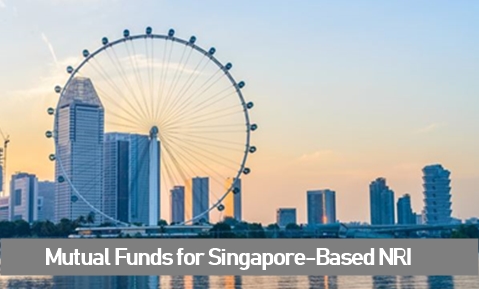
 +91-22-48913909
+91-22-48913909
Table of Contents
Mutual Fund Investment Options in India for NRIs
Mutual Funds in India are gaining immense popularity since the past few years. It is a great way to grow your money in the long run. Non-Indian Residents (NRIs) who are planning to invest in Mutual Funds in India, you are at the right place to know the details on investment options in India. NRIs based in the US and Canada, there are some fund houses in India that allow you to invest in Mutual Funds in India. Non-US-and-Canada based NRIs can invest in across Asset Management Companies in India. Let's understand the KYC procedure to begin your Mutual Fund investments in India, Taxation for NRIs along with the Best Performing Mutual Funds schemes to invest 2025 - 2026.
Talk to our investment specialist

NRE, NRO, FCNR Accounts for Investment in India
To invest in Mutual Funds in India one is supposed to open any of the following accounts with an Indian Bank:
NRE Account
This is Non-Resident External (NRE) account which can be in the form of savings, current, fixed or Recurring deposit. You need to deposit the foreign currency in this account. To be able to deposit Indian currency, you must open NRO account. There is no upper limit on the transaction amount in an NRE account.
NRO Account
The NRO or Non-Resident Ordinary account is in the form of savings or current account that is meant for NRIs to manage their Income earned in India. In NRO account, foreign currency gets converted into Indian rupees after it gets deposited. An NRO account can be held jointly with another NRI as well as resident Indian (close relatives).
FCNR Account
This stands for Foreign Currency Non-Repatriable account deposits. In this account, NRIs can remit their Earnings in one of the six currencies such as Canadian $, US$, Euro, AU$, Yen, and Pound. Funds can be transferred from other FCNR or NRE accounts. In FCNR, the principal and interest don’t accrue any tax.
Once you open any of these accounts, you need successfully complete your KYC (Know Your Customer), under KYC norms, which is set by SEBI (Securities Exchange Board of India). One can complete their KYC with any of the SEBI-registered intermediates.
Mutual Fund Options for NRIs based in US and Canada
NRIs based in the USA and Canada would be able to invest in only some of the Mutual Fund Houses in India. Many AMCs in India are yet to allow investments from NRIs based in USA or Canada. This is due to the complex compliance requirements under Foreign Account Tax Compliance Act (FATCA). Under FATCA, all the financial entities like mutual fund houses, Insurance companies, banks are supposed to furnish their client information to the Government of India that will further be shared with the US/Canadian Government.
Since the time FATCA have come into place, many AMCs have stopped accepting investments from NRIs based in the US and Canada as it involved a lot of paperwork and compliance on the part of AMCs.
These are the list of the following AMCs that accept investments from US/Canada based NRIs:
- Sundaram Mutual Fund
- DHFL Pramerica Mutual Fund
- Reliance Mutual Fund
- L&T Mutual Fund
- BNP Paribas Mutual Fund
- UTI Mutual Fund
Each of these AMC has a different condition to accept investments from US or Canada based NRIs. Some of the fund houses amongst these accept investments only in paper application forms, whereas a few may accept online application through NSE NMFII or BSE STARMF platform etc.
Following are some of the best performing schemes from the above mentioned fund houses that accept NRI investments from US & Canada:
Fund 3 MO (%) 6 MO (%) 1 YR (%) 3 YR (%) 5 YR (%) 2023 (%) Sub Cat. UTI Transportation & Logistics Fund Growth -3.8 -16.4 -1.4 21.2 30 18.7 Sectoral L&T Infrastructure Fund Growth -4.7 -16.9 3.5 20.6 30.9 28.1 Sectoral Sundaram Mid Cap Fund Growth -3.9 -13.1 10.6 20.2 29.3 32 Mid Cap UTI Infrastructure Fund Growth 1.4 -11 3.4 19.5 27.5 18.5 Sectoral L&T India Value Fund Growth -2.2 -11.6 6.9 19.2 30.6 25.9 Value L&T Business Cycles Fund Growth -3.1 -13.8 10.3 19.1 28.6 36.3 Sectoral UTI Core Equity Fund Growth -2.4 -10.7 10.4 18.7 29 27.2 Large & Mid Cap UTI Healthcare Fund Growth -4.7 -8.8 20.3 18.7 22.3 42.9 Sectoral Sundaram Financial Services Opportunities Fund Growth 7 -1.6 9.7 18.2 25.7 7.1 Sectoral Sundaram Infrastructure Advantage Fund Growth -3.1 -13.9 1.9 18.1 30.5 23.8 Sectoral Note: Returns up to 1 year are on absolute basis & more than 1 year are on CAGR basis. as on 15 Apr 25
Best Mutual Fund Schemes for NRIs based in Other Countries
In case of Non Residents from other countries, i.e. other than based in US or Canada, the Investing procedure is quite simplified. You can invest in any of the mutual fund houses in India. To ease your investments, we have shortlisted some of the best performing mutual fund schemes that you can prefer investing in.
Fund 3 MO (%) 6 MO (%) 1 YR (%) 3 YR (%) 5 YR (%) 2023 (%) Sub Cat. SBI PSU Fund Growth 2.4 -9.8 0.8 28.4 30.4 23.5 Sectoral HDFC Infrastructure Fund Growth -0.1 -10.3 3.7 27.5 35.4 23 Sectoral Invesco India PSU Equity Fund Growth 2 -12.3 1.1 27 28.7 25.6 Sectoral ICICI Prudential Infrastructure Fund Growth -0.1 -10.2 5.2 26.9 38.2 27.4 Sectoral Franklin India Opportunities Fund Growth -4.1 -10.4 11.9 26.6 32.5 37.3 Sectoral Nippon India Power and Infra Fund Growth -2.4 -14.8 1.2 26.5 35.7 26.9 Sectoral Franklin Build India Fund Growth -2.1 -11.8 3.9 25.8 34.3 27.8 Sectoral Principal Global Opportunities Fund Growth 2.9 3.1 25.8 24.8 16.5 Global DSP BlackRock India T.I.G.E.R Fund Growth -4.8 -18.1 3.3 24.2 34.8 32.4 Sectoral IDFC Infrastructure Fund Growth -4.5 -15.9 3.3 24.1 35.6 39.3 Sectoral Note: Returns up to 1 year are on absolute basis & more than 1 year are on CAGR basis. as on 15 Apr 25
Comparison between NRO, NRE & FCNR Account
| Parameters | NRE Account | NRO Account | FCNR Account |
|---|---|---|---|
| Purpose | NRE is an account of an NRI to transfer foreign earnings to India | NRE is an account of an NRI to transfer foreign earnings to India | NRIs can remit their earnings in one of the six currencies such as Canadian $, US$, Euro, AU$, Yen, and Pound |
| Current account & Savings Account | Yes | Yes | No, these are FD accounts |
| Joint Account with NRI | Yes | Yes | Yes |
| Joint Account with Resident Indian | Yes, with close relatives only | Yes | Yes, with close relatives only |
| Income generated in India can be held? | No | Yes | No |
| Funds can be transferred to any Bank in India? | Yes | Yes | No |
| Repatriation | Yes | No. Only interest income generated from deposits can be repatriated | Yes |
| When settled back in in India permanently | Account gets converted to resident account | Account gets converted to resident account | Account gets converted to resident account |
KYC Procedure for NRIs to Invest in Mutual Funds
To successfully complete your KYC procedure, NRIs need to complete certain important steps and furnish documents like:
a. KYC Form
An NRI needs to submit the KYC Form with all the necessary details filled to the SEBI registered intermediate. The documents can be sent by courier/post to the intermediate.
b. Documents
Following are the necessary documents that need to be submitted:
- Overseas address proof
- Indian resident address proof
- A recent photograph
- Passport copy
In case of NRIs in the Merchant Navy, a mariner’s declaration or certified copy of Continuous Discharge Certificate must be submitted.
c. Attestation
NRIs or PIOs (Person of India Origin) can get the above documents attested by the authorised officials of overseas branches of scheduled commercial banks registered in India, judge, court magistrate, public notaries, or the Indian embassy/consulate general in the country that they are located.
d. In Personal Verification (IPV)
As per SEBI rules, IPV is mandatory for KYC process. The intermediate should conduct the IPV of NRIs/PIOs.
Please note that all the above documents/proofs while submitting should be in the English language.
Taxation on Mutual funds for NRI Investors
Capital Gains Tax Rates on NRI Mutual Fund Investments for the Financial Year 2017-18 (Assessment Year 2018-19) are as below:
| Gains | Equity Linked Funds | Debt Linked Funds |
|---|---|---|
| Tax on Short Term Capital Gain | 15% | As per Tax Slabs of NRI |
| Tax on Long Term Capital Gain (with Indexation) | NIL | 20% |
| Tax on Long Term Capital Gain (without Indexation) | NIL | 10% |
| STCG & TDS Rate | 15% | 30% |
| LTCG & TDS Rate | Nil | 30% On listed funds- 20% (with indexation), unlisted funds- 10% (without indexation) |
All efforts have been made to ensure the information provided here is accurate. However, no guarantees are made regarding correctness of data. Please verify with scheme information document before making any investment.











